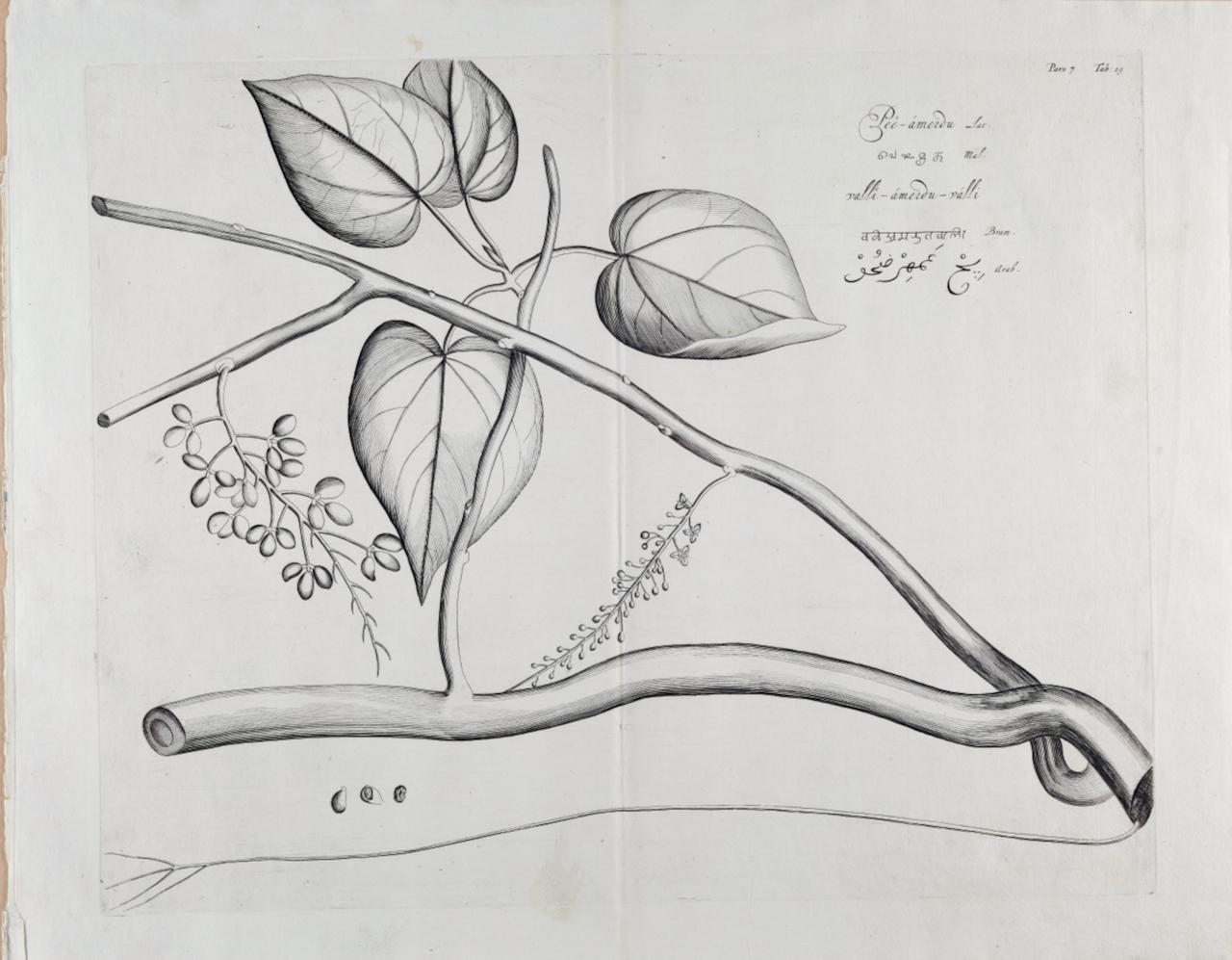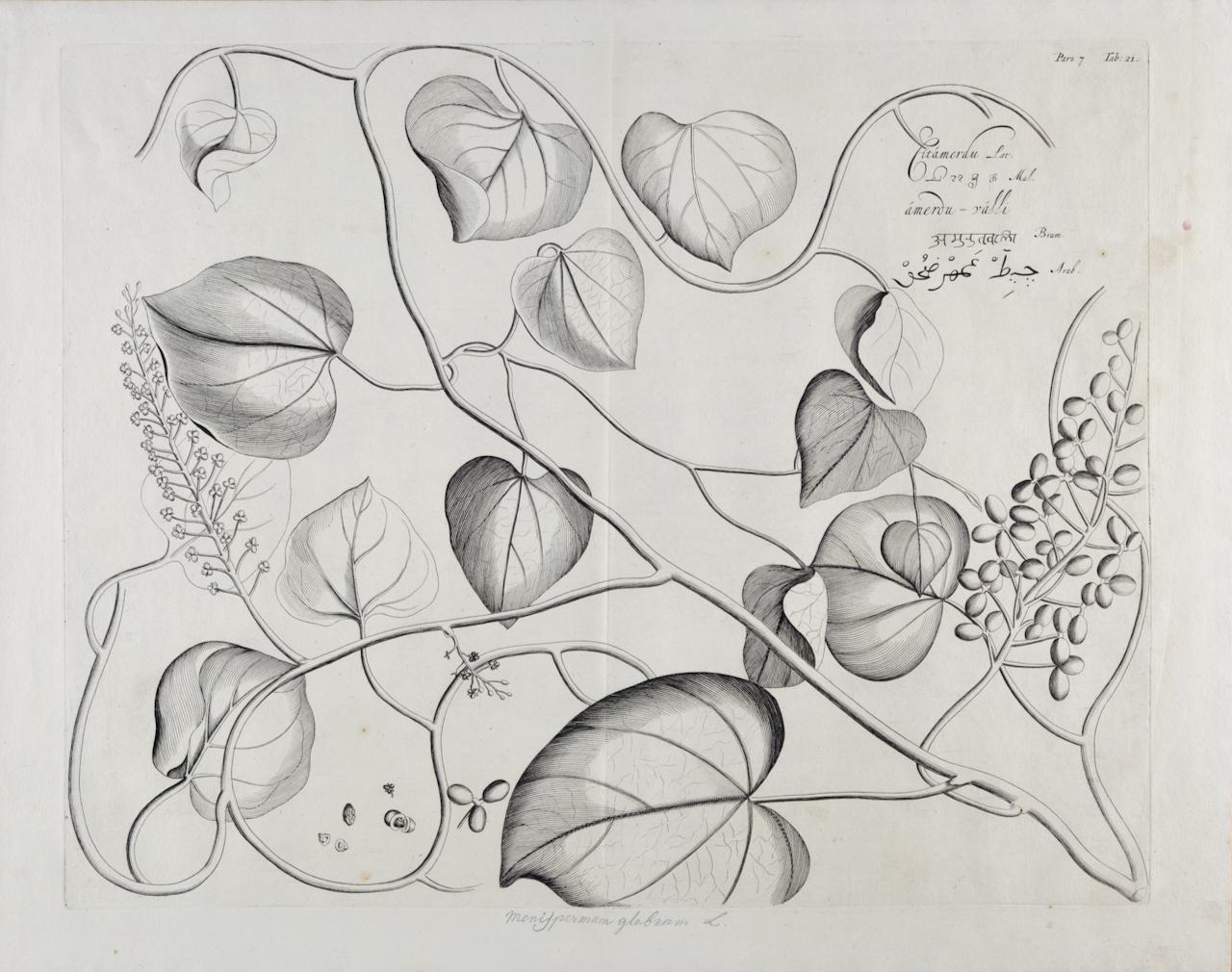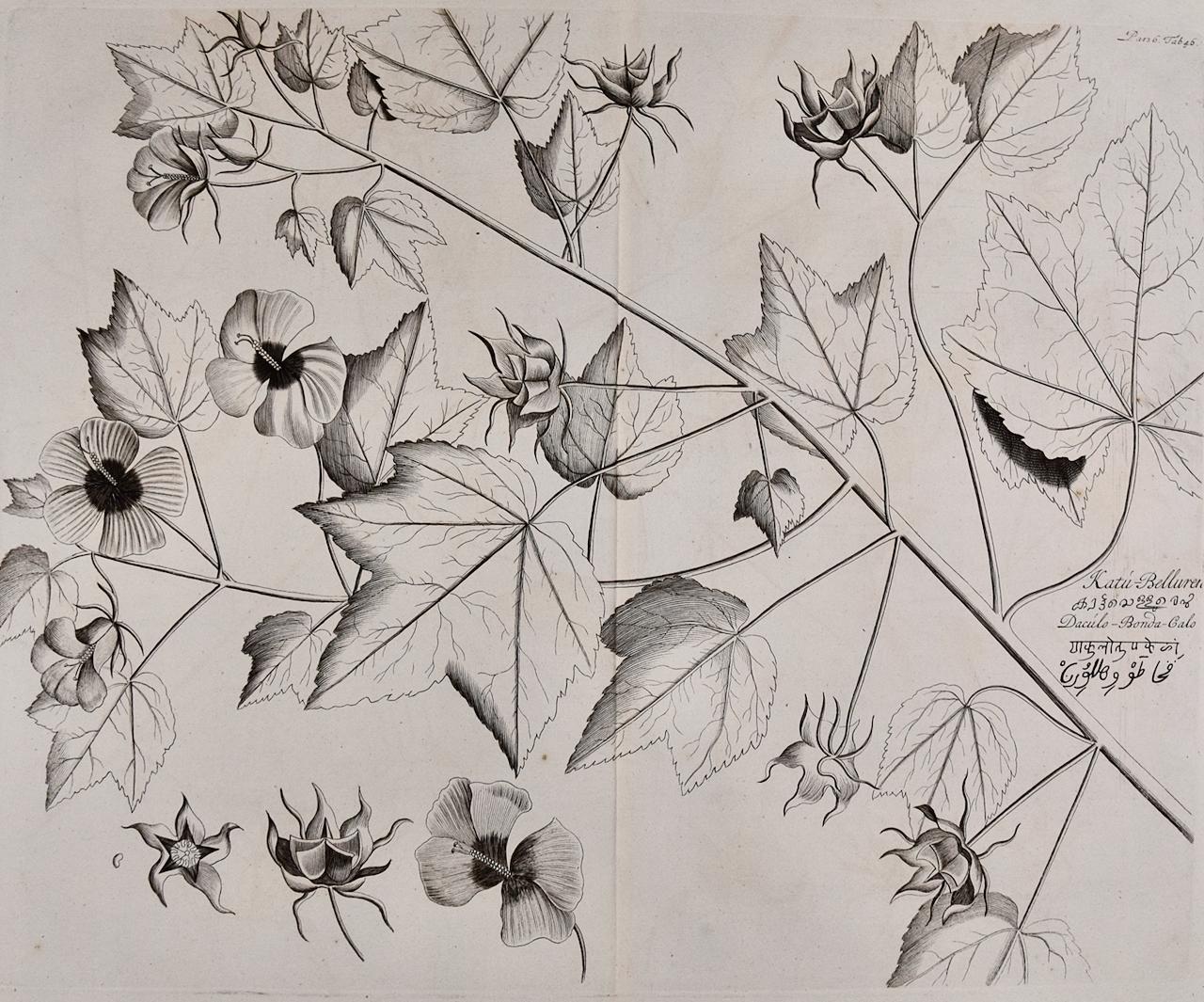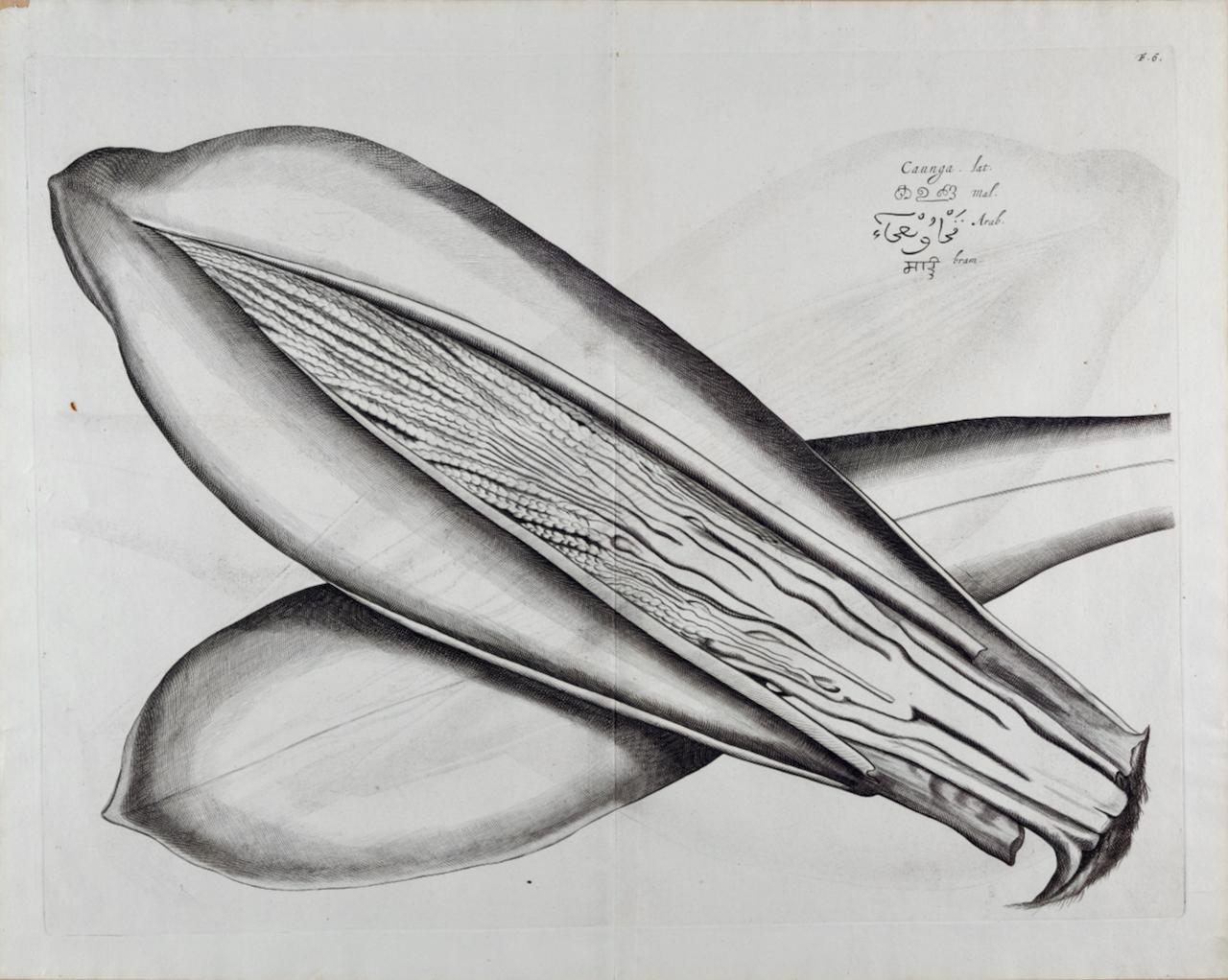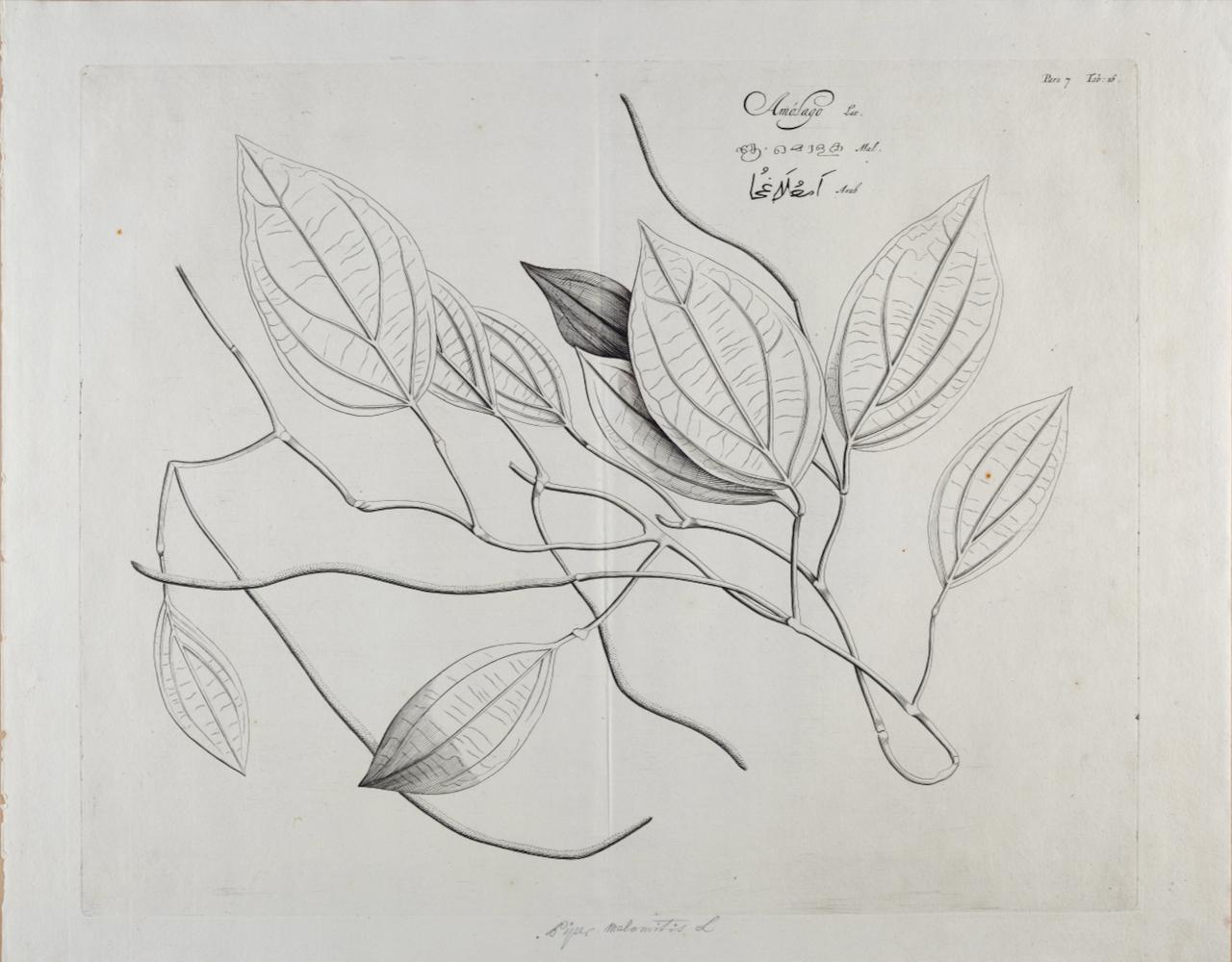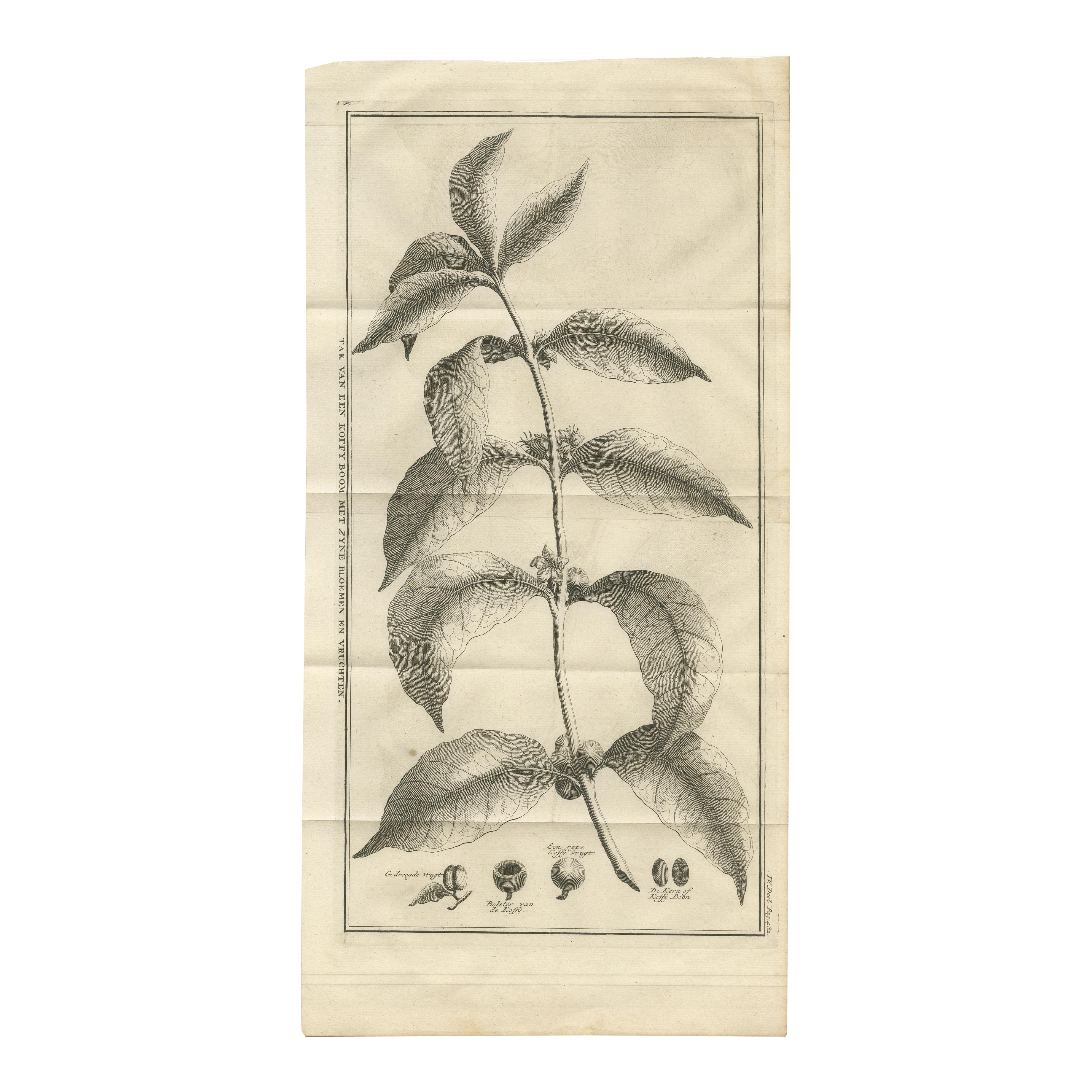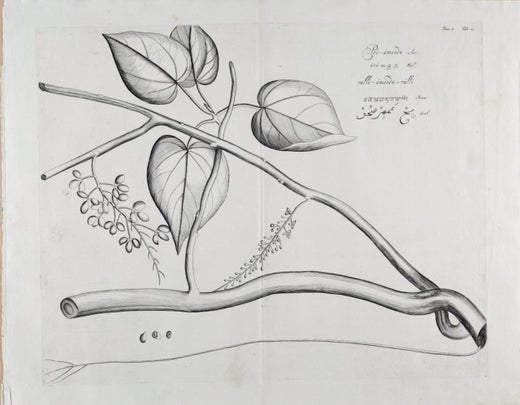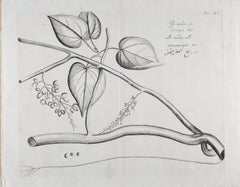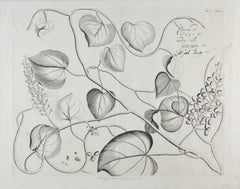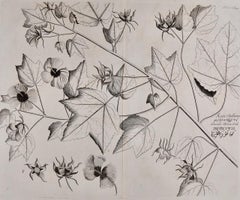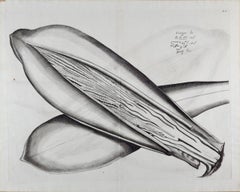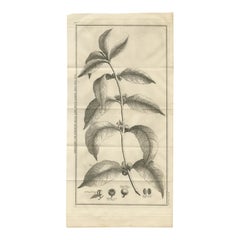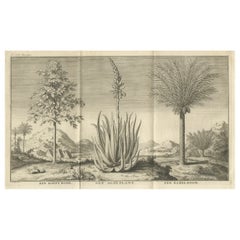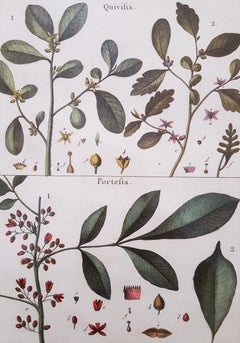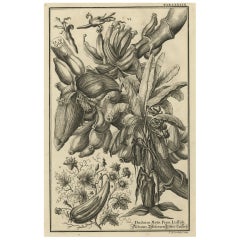Items Similar to Fever Nut Plant "Ban Caretti": A 17th Century Engraving by Hendrik van Rheede
Want more images or videos?
Request additional images or videos from the seller
1 of 12
Hendrik Adriaan van Rheede tot DrakensteinFever Nut Plant "Ban Caretti": A 17th Century Engraving by Hendrik van Rheede1686
1686
$1,375
£1,038.27
€1,196.50
CA$1,940.71
A$2,139.59
CHF 1,119.36
MX$26,248.77
NOK 14,090.57
SEK 13,176.91
DKK 8,935.47
About the Item
This is a 17th century engraving of a fever or bonduc nut plant entitled "Ban Caretti" by Hendrik van Rheede tot Drakenstein, plate 20 from his 'Hortus Indicus Malabaricus' (Garden of Malabar), published in Amsterdam in 1686 by Johann van Someren. The engraving depicts the Malabar Ban Caretti plant, which is native to South Asia, originally in the rainy tropical regions of the Malabar Coast of India and Sri Lanka, but it is now grown in backyard gardens around the world. The publication features illustrations of exotic plants and fruits labelled with script in Latin, Malay, Arabic, and Sanskrit. Hortus Indicus Malabaricus is believed to be the earliest comprehensive published work on the flora of Asia and the tropics. The 17th century treatise featured important illustrations of 740 plants of the region, including Indian medicinal plants.
The engraving is printed on 17th century laid, chain-linked paper. The sheet measures 15" high by 18.63" wide. There is a central fold, as issued. There are a small number of tiny spots and faint discoloration at the outer edge of the upper and right margins. The print is otherwise in excellent condition. The original Latin descriptive text page is included.
There are two additional Rheede botanical engravings from his 'Hortus Indicus Malabaricus' publication that are listed on my 1stdibs storefront. These would make for an impressive display grouping. A discount is available for purchase of two or more of the prints. To view the additional Rheede prints, enter their reference number in the 1stdibs search field: LU1173211002002 and LU1173211002322. Alternatively, these prints can be viewed on my 1stdibs storefront by typing timeless intaglio in the search field and tapping on the dropdown name.
Hendrik Adriaan van Rheede tot Drakenstein (1636-1691) was a botanist, naturalist, and a colonial administrator of the Dutch East India Company. He also served as the governor of Dutch Malabar between 1669 and 1676. The Malabar coast, the Western Ghats district, a region principally covering the areas which are presently in the Indian states of Kerala, Karnataka and Goa.
- Creator:Hendrik Adriaan van Rheede tot Drakenstein (1636 - 1691, Dutch)
- Creation Year:1686
- Dimensions:Height: 15 in (38.1 cm)Width: 18.63 in (47.33 cm)
- Medium:
- Movement & Style:
- Period:Late 17th Century
- Framing:Framing Options Available
- Condition:
- Gallery Location:Alamo, CA
- Reference Number:Seller: # 47601stDibs: LU1173211002312
undefined
About the Seller
5.0
Gold Seller
Premium sellers maintaining a 4.3+ rating and 24-hour response times
Established in 2011
1stDibs seller since 2019
289 sales on 1stDibs
Typical response time: 1 hour
- ShippingRetrieving quote...Shipping from: Alamo, CA
- Return Policy
Authenticity Guarantee
In the unlikely event there’s an issue with an item’s authenticity, contact us within 1 year for a full refund. DetailsMoney-Back Guarantee
If your item is not as described, is damaged in transit, or does not arrive, contact us within 7 days for a full refund. Details24-Hour Cancellation
You have a 24-hour grace period in which to reconsider your purchase, with no questions asked.Vetted Professional Sellers
Our world-class sellers must adhere to strict standards for service and quality, maintaining the integrity of our listings.Price-Match Guarantee
If you find that a seller listed the same item for a lower price elsewhere, we’ll match it.Trusted Global Delivery
Our best-in-class carrier network provides specialized shipping options worldwide, including custom delivery.More From This Seller
View AllPee-amerdu Plant: A Rare 17th Century Botanical Engraving by H. van Rheede
Located in Alamo, CA
This is a rare 17th century engraving of a plant entitled "Pee-amerdu" by the Dutch botanist Hendrik van Rheede tot Drakenstein, plate 19 from his 'Hortus Indicus Malabaricus' (Garden of Malabar), published in Amsterdam in 1686 by Johann van Someren. The engraving depicts the Pee-amerdu plant, a large leafed plant climbing plant off the Malabar Coast in India. The plant is noted for its medicinal uses. It may be related to Tinospora species. Rheede's 19th century publication featured illustrations of exotic plants and fruits labelled with script in the upper right corner in Latin, Malay, Arabic, and Sanskrit. Hortus Indicus Malabaricus is believed to be the earliest comprehensive published work on the flora of Asia and the tropics. The 17th century treatise featured important illustrations of 740 plants of the region, including Indian medicinal plants.
The engraving is printed on 17th century laid, chain-linked watermarked paper. The sheet measures 14.88" high by 18.75" wide. There is a central fold, as issued. There are a few faint smudges, a spot in the upper margin and there is minimal irregularity of the left edge of the paper where the print was previously bound in the 17th century publication. The print is otherwise in very good condition.
There are additional Rheede botanical engravings from his 'Hortus Indicus Malabaricus' publication that are listed on my 1stdibs storefront and online website. These would make for an impressive display grouping. A discount is available for purchase of two or more of the prints.
Hendrik Adriaan van Rheede tot Drakenstein...
Category
Late 17th Century Naturalistic Landscape Prints
Materials
Engraving
Citamerdu (Amrita) Plant: 17th Century Botanical Engraving by Hendrik van Rheede
Located in Alamo, CA
This is a rare 17th century engraving of a plant entitled "Citamerdu" by the Dutch botanist Hendrik van Rheede tot Drakenstein, plate 21 from his 'Hortus Indicus Malabaricus' (Garden of Malabar), published in Amsterdam in 1686 by Johann van Someren. The engraving depicts the Citamerdu plant, also known as Tinospora cordifolia plant or Amrita and Guduchi. It is a deciduous plant with heart-shaped leaves, greenish flowers, and pea-shaped fruits. Rheede's 19th century publication featured illustrations of exotic plants and fruits labelled with script in the upper right corner in Latin, Malay, Arabic, and Sanskrit. Hortus Indicus Malabaricus is believed to be the earliest comprehensive published work on the flora of Asia and the tropics. The 17th century treatise featured important illustrations of 740 plants of the region, including Indian medicinal plants.
The engraving is printed on 17th century laid, chain-linked paper, watermarked with an elaborate crown design. The sheet measures 15.75" high by 18.75" wide. There is a central fold, as issued. There are a few small spots, but the print is otherwise in excellent condition.
There are additional Rheede botanical engravings from his 'Hortus Indicus Malabaricus' publication that are listed on my 1stdibs storefront and online website. These would make for an impressive display grouping. A discount is available for purchase of two or more of the prints.
Hendrik Adriaan van...
Category
Late 17th Century Naturalistic Landscape Prints
Materials
Engraving
"Katu-Belluren": A 17th Century Botanical Engraving by Hendrik van Rheede
Located in Alamo, CA
This is a 17th century engraving of a vine spinach plant entitled "Katu-Belluren" by Hendrik van Rheede tot Drakenstein, plate 46 from his 'Hortus Indicus M...
Category
Late 17th Century Naturalistic Landscape Prints
Materials
Engraving
Caunga Cucumber Plant: A 17th Century Botanical Engraving by Hendrik van Rheede
Located in Alamo, CA
This is a rare 17th century engraving of a plant entitled "Caunga" by the Dutch botanist Hendrik van Rheede tot Drakenstein, plate 6 from his 'Hortus Indicus Malabaricus' (Garden of Malabar), published in Amsterdam in 1686 by Johann van Someren. The engraving depicts the caunga plant, also known as Inca cucumber or horned squash, which is a climbing vine that produces edible, cucumber-like fruits. Rheede's 19th century publication featured illustrations of exotic plants and fruits labelled with script in the upper right corner in Latin, Malay, Arabic, and Sanskrit. Hortus Indicus Malabaricus is believed to be the earliest comprehensive published work on the flora of Asia and the tropics. The 17th century treatise featured important illustrations of 740 plants of the region, including Indian medicinal plants.
The engraving is printed on 17th century laid, chain-linked paper, watermarked with an elaborate crown design. The sheet measures 15.25" high by 18.88" wide. There is a central fold, as issued. There is a small dark spot on the left which appears to represent a paper inclusion which occurred when the hand-made paper was produced. The print is otherwise in excellent condition.
There are additional Rheede botanical engravings from his 'Hortus Indicus Malabaricus' publication that are listed on my 1stdibs storefront and online website. These would make for an impressive display grouping. A discount is available for purchase of two or more of the prints.
Hendrik Adriaan van Rheede tot Drakenstein...
Category
Late 17th Century Naturalistic Landscape Prints
Materials
Engraving
Amolago (Aglaonema) Plant: 17th Century Botanical Engraving by H. van Rheede
Located in Alamo, CA
This is a rare 17th century engraving of a plant entitled "Amolago" by the Dutch botanist Hendrik van Rheede tot Drakenstein, plate 16 from his 'Hortus Indicus Malabaricus' (Garden of Malabar), published in Amsterdam in 1686 by Johann van Someren. The engraving depicts the Amolago plant, a large leafed plant, possibly corresponding to the present day aglaonema plant. Rheede's 19th century publication featured illustrations of exotic plants and fruits labelled with script in the upper right corner in Latin, Malay, Arabic, and Sanskrit. Hortus Indicus Malabaricus is believed to be the earliest comprehensive published work on the flora of Asia and the tropics. The 17th century treatise featured important illustrations of 740 plants of the region, including Indian medicinal plants.
The engraving is printed on 17th century laid, chain-linked paper. The sheet measures 14.75" high by 17.25" wide. There is a central fold, as issued. There are a few tiny spots and there is minimal irregularity of the left edge of the paper where the print was previously bound in the 17th century publication. The print is otherwise in very good condition.
There are additional Rheede botanical engravings from his 'Hortus Indicus Malabaricus' publication that are listed on my 1stdibs storefront and online website. These would make for an impressive display grouping. A discount is available for purchase of two or more of the prints.
Hendrik Adriaan van...
Category
Late 17th Century Naturalistic Landscape Prints
Materials
Engraving
Flowering Chestnut Plant: 18th C. Hand-colored Botanical Engraving by Weinmann
By Johann Wilhelm Weinmann
Located in Alamo, CA
This hand-colored botanical mezzotint and line engraving by Johann Wilhelm Weinmann (1683-1741) is entitled "Castanea Equina, Chateignier amaire (Horse Chestnut)". It is plate 342 in...
Category
Mid-18th Century Naturalistic Still-life Prints
Materials
Engraving, Mezzotint
You May Also Like
Botanical Engraving of the Coffee Plant – Dutch Colonial Period, c.1737
Located in Langweer, NL
Botanical Engraving of the Coffee Plant – Dutch Colonial Period, c.1737
This exquisite botanical engraving depicts the coffee plant in detailed scientific form, as it was studied an...
Category
Antique 1730s Dutch Prints
Materials
Paper
Coffee, Aloe, and Date Trees – Exotic Botanical Engraving, Dutch, c.1730
Located in Langweer, NL
Coffee, Aloe, and Date Trees – Exotic Botanical Engraving, Dutch, c.1730
This large and finely detailed copper engraving showcases three important tropical and subtropical plants: t...
Category
Antique 1730s Dutch Prints
Materials
Paper
Quivisia; Portesia /// Antique Botanical Botany Plants Science Engraving Buffon
By Georges-Louis Leclerc, Comte de Buffon
Located in Saint Augustine, FL
Artist: Georges-Louis Leclerc, Comte de Buffon (French, 1707-1788)
Title: "Quivisia; Portesia" (Octandreie, Monogynie, Plate 302)
Portfolio: Histoire Naturelle
Year: 1749-1789
Medium: Original Hand-Colored Engraving on laid paper
Limited edition: Unknown
Printer: Imprimerie Nationale, Paris, France
Publisher: Georges-Louis Leclerc, Comte de Buffon, Paris, France
Framing: Not framed, but beautifully double matted with hand decorated archival French matting...
Category
2010s Naturalistic Still-life Prints
Materials
Watercolor, Engraving, Laid Paper, Intaglio
Biblical Botanical Print – Dudaim Melon Engraving by Corvinus, 1731
Located in Langweer, NL
Dudaim Melon Botanical Engraving – Corvinus after Scheuchzer, 1731
This antique botanical print, titled ‘Dudaim, Melo, Pepo, Luffah,’ depicts the Dudaim Melon (Cucumis melo var. dudaim) alongside flowering vines and fruits in striking baroque style. It originates from Johann Jakob Scheuchzer’s monumental work Physica Sacra...
Category
Antique 1730s Swiss Prints
Materials
Paper
Botanical Engraving of Tithymalus Aiz Arbor from Caspar Commelin’s Work, 1706
Located in Langweer, NL
Botanical Engraving of Tithymalus Aiz Arbor from Caspar Commelin’s Work, 1706
This engraving is possibly a botanical illustration from Caspar Commelin's "Praeludia Botanica," publis...
Category
Antique Early 1700s Prints
Materials
Paper
$277 Sale Price
20% Off
Tamarin (Tamarind), French botanical herbal medicinal flower engraving, 1818
By After Pierre Turpin
Located in Melbourne, Victoria
French botanical flower engraving, 1818.
Colour-printed stipple engraving by J Lambert after Pierre Turpin (1775-1840)
From Francois Pierre Chaumeton's 'Flore Medicale' which portrayed a variety of flowers, trees and herbs which could be used for treating illnesses. The engravings were produced during the great period of French colour printing using the stipple-engraving process pioneered by the great botanical artist Pierre-Jospeh Redoute. The artist is the celebrated Pierre Jean Francois Turpin...
Category
Early 19th Century Victorian More Prints
Materials
Engraving
More Ways To Browse
India Engraving
Kerala Antique
Van Rheede
Hendrik Adriaan Van Rheede Tot Drakenstein
Billy The Artist
Christo Poster
Constable Lucas
Hawaiian Prints Webber
Petra Antique
Roger Muhl
Beto De La Rocha
Bolton Brown
Francois Desnoyer
Hasui Kawase
John Frederick Lewis
Lebanon Poster
Peter Max Flag With Heart
Prints Fireworks
